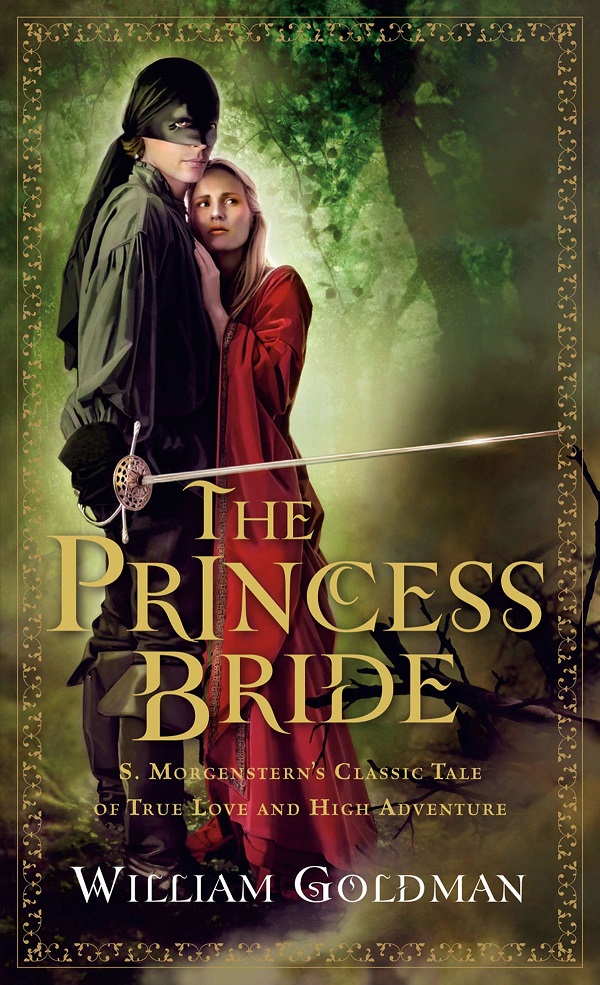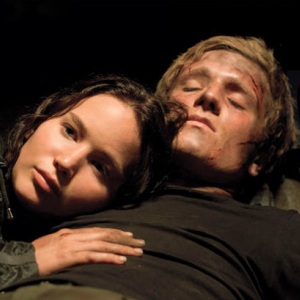
About the Book
-
Author:
- William Goldman
- Genre:
- Fantasy
Cover Story: Kindle It
BFF Charm: Meh
Swoonworthy Scale: 9,000,000,000, unless you stop to think about it
Talky Talk: Meta Swashbuckler
Bonus Factors: Two Truths and a Lie, Fezzik, EVERYTHING ELSE
Relationship Status: Wuv, Twue Wuv
Cover Story: Kindle It
Ugh, this. It’s like the cover of some maudlin romance novel, only especially terrible because they’re both fully clothed. The fact that it says “The Princess Bride” in giant text across the front should give you a pass from any judging eyes on your morning commute, because anybody who doesn’t like The Princess Bride can GTFO. But I don’t want to have to look at that cover either.
Furthermore, what REALLY puts me off this version is that it so obviously panders to fans of the movie. The whole idea of reprinting books with movie tie-ins offends me, and I will go to great lengths to avoid reading such an edition. Look. We all know the movie is perfection. That’s not up for debate. We also know that I am probably only reading this book because of the movie. William Goldman says as much in his latest introduction. But I am trying to read and enjoy this book as its own entity, without the annoying fangirl part of my brain making comments like, “Billy Crystal changed that line slightly and I like it better that way.” This Designer Imposter cover is NOT HELPING MY CAUSE.
I would, however, like a first edition print version.
The Deal:
Ok, ok, we all know the deal. But I’m trying to review his book objectively, without respect to the film. Which yes, is probably not possible since I have all the dialogue memorized. But I shall do my best all the same.
At ten years old, William Goldman catches pneumonia and is stuck in bed. His father comes in to read a story called The Princess Bride by S. Morgenstern, which captivates young Willy almost immediately. Years later, he gives the book to his son, who can barely make it past the first chapter. Turns out that Goldman’s father had left out large chunks of boring bits. Goldman, frustrated by his son’s disinterest, sets out to abridge the story, keeping only “the good parts,” as well as some adding some annotations mid-story.
The Princess Bride tells the story of Buttercup, a young milkmaid who lives on a farm in Florin. Despite her complete lack of hygiene, she grows up to be one of the most beautiful women in the world. Eschewing many a suitor, Buttercup eventually falls in love with a poor farm hand, Westley. Returning her affection, Westley sets out to seek his fortune so they can make a life together, but is quickly captured and murdered by the notorious Dread Pirate Roberts.
Heartbroken, Buttercup vows to never love again. Even more unfortunately for her, Prince Humperdinck, noted sociopath and heir to the Florin throne, picks Buttercup to be his future bride on account of her unsurpassed beauty. Buttercup resigns herself to a life of unhappiness with Humperdinck, but everything changes when a mysterious trio of misfits kidnap her in a plot to set Florin at war.
BFF Charm: Meh

Unpopular opinions by Alix: Buttercup is kind of… useless.
I know, I know. But put down your pitchforks, banish Robin Wright from your mind for a second, and hear me out. Buttercup is super lame! Not by real people standards, but by book heroine standards? I want something more before I start doling out my BFF charms. Plus she’s always threatening to off herself, which would be super annoying and stressful in a best friend. Not that she’d ever go through with it, because she never actually DOES anything. She’s one of the most reactive characters I’ve come across since Bella Swan. Everything happens TO her, and then she just responds. And her response, more often than not, goes something like, “oh well I’ll just lay down and die now because my life is terrible.”
And her life IS terrible–I’m not discrediting that. At first, I was pretty annoyed with Goldman for writing such a blah female character. But as I kept reading, I realized that Goldman is way too good a writer for this shit. Bella Swan is the product of laziness and incompetence. Buttercup is both complex and deliberate. She has no fight in her because it has already been beaten down. At the beginning of the story, she is confident, sassy, and headstrong. She doesn’t take crap from her parents, doesn’t pay any mind to the dudes that are falling are over her, and doesn’t take Westley’s love for granted. When he dies, it kind of destroys her, and then this awful man comes along and offers her the choice of marrying him or dying a painful death. Her outward appearance of confidence is still there, but it’s easily cracked and broken. I feel for the girl.
All that said, she still kind of sucks and won’t be getting my BFF charm anytime soon.
Swoonworthy Scale: 9,000,000,000, unless you stop to think about it
Ok, I know I said I’d stay away from comparing it to the movie, but Cary Elwes! Cary Elwes!
It’s really hard to separate Cary Elwes from my perception of swoon in this book, but I think it’s still v. swoony, even removing him from the equation. Which doesn’t really make any sense, because quite frankly, the love story here is completely insane. Basically, Buttercup shits all over Westley his entire life, then one day, is like “I love you!” and he’s like, “I love you more! Which is why I must leave to seek my fortune!” and then he DIES. Also there’s some gross emotional manipulation happening later that I don’t want to spoil for the one person who has never read/seen The Princess Bride.* Analyzing all that, the voice in my head is shouting, “And like, we’re expected to swoon? I don’t think so!” And William Goldman is saying, “Yes, you are expected to swoon. Swoon now!” and for some ineffable reason, it works. Anyway, the love story really should not be as compelling as it is, with or without Cary Elwes.
*Yes, such a person does exist. Until two weeks ago, it was my friend Kirsten, who had never even heard of The Princess Bride. I know. Don’t worry, we’ve since fixed her.
Talky Talk: Meta Swashbuckler
There’s two things going on in this book–the first is the fairytale-like, swashbuckling romance-adventure that comprises the bulk of the narrative; the second is this weird, rambly frame story featuring a somewhat fictionalized version of Goldman’s own life and a wholly fictional account of S. Morgenstern and his imaginary book. It serves as a bizarre but fascinating commentary on the entire life-cycle of a novel, from writing, editing, publishing, through to reading the last page. I love the overall plot of the book, but I wasn’t quite sure what to make of the frame story.
For starters, Goldman’s lengthy interruptions are rather annoying. I groaned internally as we slowed down plot progression for these entertaining yet seemingly irrelevant passages. For instance,
The reason for the soliloquy here is that Morgenstern’s previous book had gotten bombed by the critics and also hadn’t sold beans. (Aside–did you know that Robert Browning’s first book of poems didn’t sell one copy? True. Even his mother didn’t buy it at her local bookstore. Have you ever heard anything more humiliating? How would you like to have been Browning and it’s your first book and you have these secret hopes that now, now you’ll be somebody. Established, Important. And you give it a week before you ask the publisher how things are going, because you don’t want to seem pushy or anything. And then maybe you drop by, and it was probably all very English and understated in those days, and you’re Browning and you chitchat around a bit before you drop the biggie: ‘Oh, by the way, any notions yet on how my poems might be doing?’ And then his editor, who has been dreading this moment, probably says, ‘Well, you know how it is with poetry these days; nothing’s taking off like it used to, requires a bit of time for the word to get around.’ And then finally, somebody had to say it. ‘None, Bob. Sorry, Bob, no, we haven’t yet had one authenticated sale. We thought for a bit that Hatchards had a potential buyer down by Piccadilly, but it didn’t quite work out. Sorry, Bob; of course we’ll keep you posted in the event of a breakthrough.’ End of Aside.)

My thoughts exactly, Michael. MOAR FEZZIK!
But the more I think about it, I find these random asides to be more interesting than the actual book. There are so many things to unpack about this passage:
1) Is this true? Goldman is kind of a pathological liar throughout this book (more on this in a minute), so it’s probably not true. But then it could be true, because sometimes he drops in Actual Facts just to fuck with you. I see a Wikipedia search in my near future.
2) Goldman interrupts the narrative to tell us that you cut out a large, rambly chunk of copy that’s irrelevant to the plot (because as readers, we are only interested in Plot) with a large, rambly chunk of copy. I see what you did there.
3) Goldman is clearly not talking about either S. Morgenstern or Robert Browning in this passage.
4) Goldman has seen Rear Window way too many times.
In conclusion, everything is genius and I will have to reread this book over and over.
Bonus Factor: Two Truths and a Lie

As I mentioned before, Goldman manipulates the truth constantly. Instead of creating a fictional character to pose the frame story, he creates a fictionalized version of himself, mixing both facts and imagination in a big pot of confusion. He addresses this (indirectly) in one of his annotations, about Morgenstern’s own asides:
Either Morgenstern meant them seriously or he didn’t. Or maybe he meant some of them seriously and some others he didn’t. But he never said which were the seriously ones. Or maybe it was just the author’s way of telling the reader stylistically that ‘this isn’t real; it never happened.’ That’s what I think, in spite of the fact that if you read back into Florinese history, it did happen. The facts, anyway; no one can say that about the actual motivations. All I can suggest to you is, if the parentheses bug you, don’t read them.
By the end of the book, I felt like Peeta. REAL OR NOT REAL, GOLDMAN?
Bonus Factor: Fezzik

Yes, Fezzik deserves his own bonus factor. Not just because André the Giant was his actor! (Though really, the two are one in the same. Despite their large stature, both seem loveable and tame.)
Bonus Factor: EVERYTHING ELSE

It’s a cop out, I know. But as Goldman himself advertises, this book really does have everything! Adventure! Fencing! Kidnapping! Pirates! Princesses! Giants! True Love! There’s something for everyone, even Fred Savage.
Casting Call:
God, can you imagine a The Princess Bride remake? Just the thought of it is criminal.
Gratuitous Pictures of Cary Elwes:
Look, I even made a new Pinterest board!
Relationship Status: Wuv, Twue Wuv
The first time I saw this movie, I thought I was in love. But I know now that was mere shallow fancy. A few more viewings, and I knew I was in love. But again! Simple infatuation. Now that I’ve finally read the book, I feel that, at long last, I know what love is, and that my affection will only grow with each re-read.
FTC Full Disclosure: I received neither money nor cocktails for writing this review (dammit!). In fact, I actually PAID MONEY for this book. And it was TOTALLY WORTH IT! Shocking, I know.